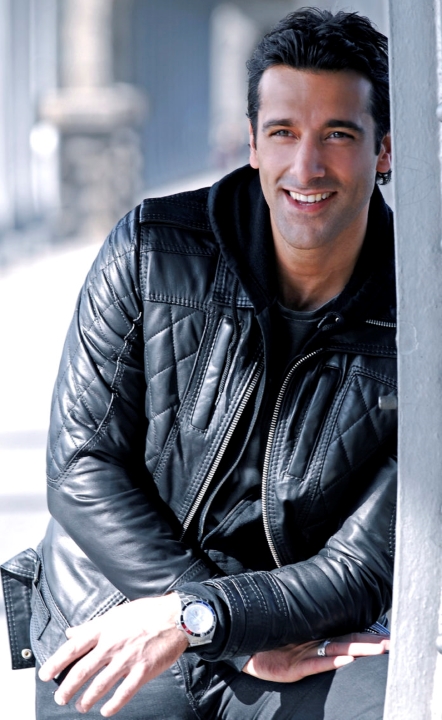PARIS — A song-through musical about Noah’s Ark, with life-sized mechanical animals and a multiethnic cast of performers singing in French is no easy theatrical task to pull off, but that is precisely what French popstar crooner Essaï Altounian accomplished in 2020-21.
Based in the Biblical story of Noah and how he is said to have repopulated the Earth, the 2020 “Noé ou La Force de Vivre” ran for over several months at the legendary Hippodrome de Longchamps in the Bois de Boulogne, in the French capital.
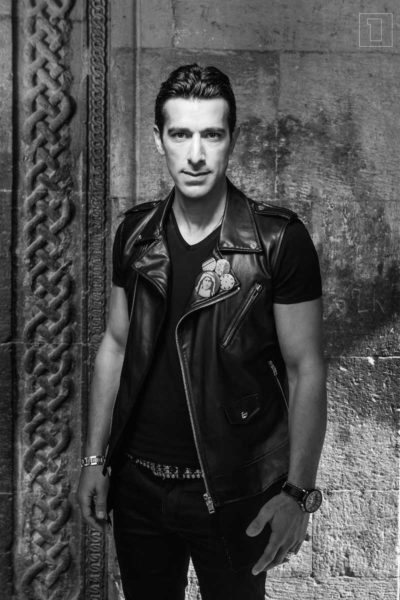
The musical takes place after the great flood that many archeologists believe may have actually occurred sometime over 5,000 years ago in Mesopotamia or present-day Iraq. It’s a story that has something for everyone. As told in the Old Testament and now recounted by Altounian and his cast, the flood serves as a parable of sorts for rebirth and cunning in the face of natural disaster. But Essaï also staged his story in a contemporary context, in light of the environmental challenges that we are facing on Earth, with increased pollution and global warming seemingly progressing unabated around the globe. As he told one French TV reporter: “The Earth doesn’t need humans to survive, but humans need the Earth to survive.” Hence the need to get out this preservationist message to the general public and remind them that we are headed for disaster if we don’t quickly change gears and protect what has been bequeathed to us on the Big Blue Marble we all call home.
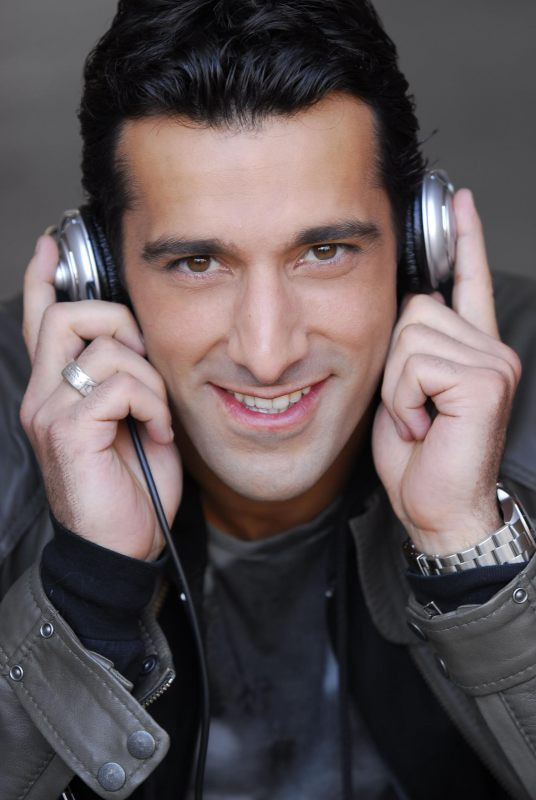
The songs in “Noé” are catchy, and the cast delivers them with brio, though they are not quite as easily memorable perhaps as the songs in “The Lion King,” which relies on similar mechanisms to move story and songs forward: puppetry, the relationship between humans and other creatures of the Earth, a patriarch who saves his kingdom. As for the muscular, sometimes-bare-chested Essaï, he looks more like an Olympic swimmer than the patriarch Noah whom he depicts in the lead role — at least as we remember him in the Old Testament — but that is a small quibble. Along with fellow actors Yanis Siad, Julien Vital, and Jade Boinet, Essaï delivers memorable tunes that have you tapping your feet and smiling throughout, particularly the lead song “Terre”: “O Terre/ Les hommes sont fiers/L’amour te sauvera” (“O Earth/Men are proud/Love will save the day”) There’s also an amazing Kochari in one segment, a reference to the fact that the Ark is said to have landed in Armenia at the foot of Mount Ararat, in a nod as well to Altounian’s Armenian origins.
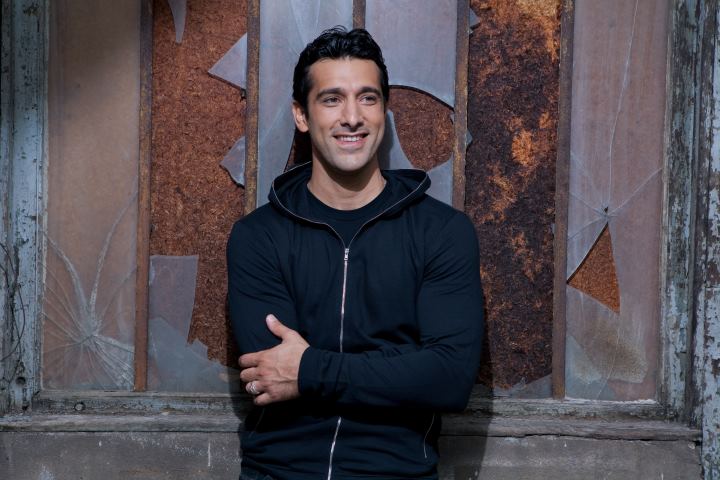
Even the briefest conversation or Zoom interview with Essaï reveals a very French desire to seduce the listener. It’s not the worst quality to have in a performer—and one that promises more success for this talented, strong-willed Parisian star.
A triple theatrical threat — songwriter, actor, singer — Essaï has been blessed with marquee good looks, a strong singing voice and a seemingly indefatigable work ethic.
Known in Europe simply by his first name, Essaï was born in 1980 to a family of Armenian Genocide survivors from Kharpert. He started off performing in public as the lead for the Soul/R & B band Ideal 3 when he was just 19 years old, singing the hit song Pardonne-Moi on the popular French TV show “Le Monde est à Vous.” He signed early on with Mercury Universal and has composed and performed on a host of French shows, including “C’est la Même Chanson,” “50 Ans de Tubes” and “Retour Gagnant.” Essaï has also portrayed Count Paris in the 2001 French musical version of “Romeo and Juliet: from Hatred to Love” (“Roméo et Juliette: de la Haine à l’Amour”) and has written for and arranged songs and lyrics for stars such as the Academy and Grammy Award-winning Michael Legrand (“Les Demoiselles de Rochefort”) and Anthony Cavanaugh.
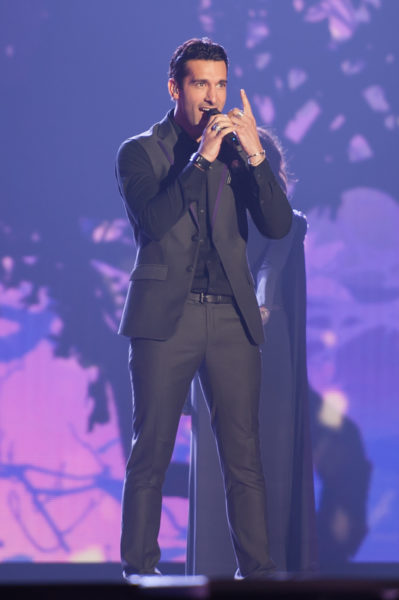
For added good measure, he also signed with the legendary Motown label while still in his early 20s. You may also have caught sight of Essaï as a judge on Armenia’s “Destination Eurovision” or on the CBS show “The World’s Best” alongside Drew Barrymore, Faith Hill and RuPaul.
Perhaps more memorably for Diasporan Armenians, he was one of the six members of the Armenian supergroup Genealogy that performed Don’t Deny to mark the 100th commemoration of the Armenian Genocide at the 2015 Eurovision song competition, along with Tamar Kaprielian, Vahe Tilbian, Stephanie Topalian, Mary-Jean O’Doherty-Basmadjian and Inga Arshkyan.
It doesn’t hurt that Essaï stands over 6 feet tall, and oozes charisma and charm from every pore in his very fit body. This sexiness is evident in his video for the song Erebuni in which he and Armenian star Emmy burn up the screen in what may well be the catchiest rendition ever recorded of Paryur Sevak and Edgar Hovannissyan’s iconic tribute to the Armenian capital.
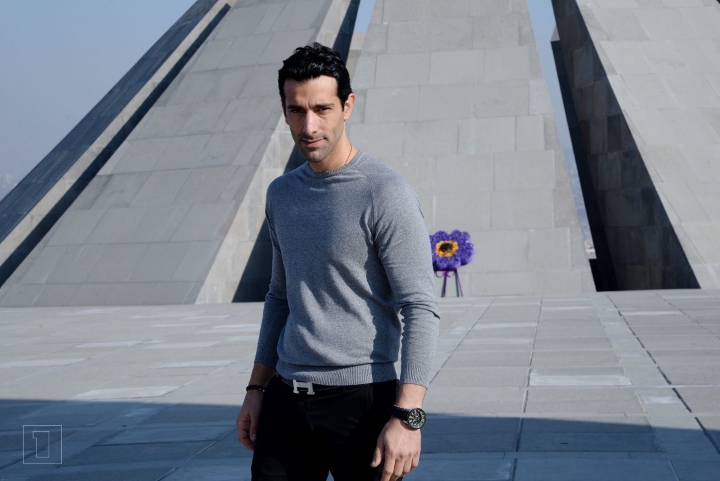
Essaï wears both his French identity and his Armenian one equally comfortably, much like one of his idols, the legendary Charles Aznavour, who was quoted on several occasions as saying: “I am 100-percent Armenian and 100-percent French.” The bilingual singer’s rendition of Tchem Morana/I Won’t Forget powerfully delivers an oft-repeated message.
Back at the ark, Essaï’s “Noé” earned critical and popular kudos although the production was delayed several times by the COVID-19 epidemic, but Essaï persevered throughout. Essaï’s philosophy about both performing and life outside the stage can best be summed up as “never give up.”
So now that “Noé” is history, should you happen to be walking down the street sometime soon and you meet a friendly gorilla named Djoko, please put him on the next flight back to Paris: he may just have lost his way from the set department at “Noé.”
Meanwhile, Altounian is hard at work on a few new projects. Stateside, an Aznavour-related project may even be in the works starring Essaï as the legendary French crooner. More to come on that, at a later date.
The Armenian Mirror-Spectator



